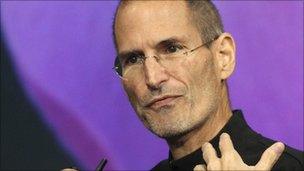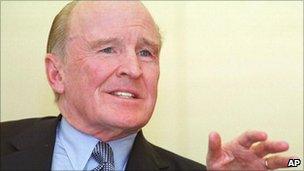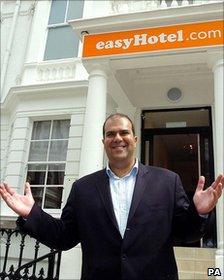Does Apple's Jobs mean companies can be one-man bands?
- Published

Steve Jobs is regarded as the person who turned Apple around
Apple shares are set to drop after Steve Jobs said he needed to take medical leave to deal with health problems, but can the fortunes of companies be bound up with one man?
Steve Jobs is the face of Apple. The sight of him in a black, polo neck jumper on a podium means to customers, journalists and shareholders that something important - perhaps a new gadget - is about to be announced.
The announcement of his indefinite departure from frontline duties was made on Monday on Martin Luther King Day, a US public holiday where the company's shares are not traded. But it was clear that the next day would see shares open down.
There are plenty of examples of private companies that are inextricably linked with a single individual.
In the UK, Richard Branson is Virgin, Philip Green is Arcadia. In listed companies, Rupert Murdoch is News Corporation and Anita Roddick was The Body Shop.
"We do tend to think very much ad hominem," says Nigel Nicholson, professor of organisational behavior at the London Business School.
"The fortunes of businesses are determined by multiple factors. What is the role of leader in the business?
"Steve Jobs is a very hands-on leader, however since he rejoined the company [1996-1997] after being away for 12 years, he reshaped the business. There are people out there in listed and unlisted companies who have an enormous effect on the business.
"Even more anonymous corporates get associated with the leader."
One of the most celebrated chief executives ever was Jack Welch, who ran General Electric from 1981 until 2001. A guru to thousands of would-be management stars, he laid off staff at the giant corporation, streamlined its businesses and increased the share price. After retirement, his books Winning and Jac: Straight from the Gut were bestsellers.
But there are those who argue - as does this economics professor in the New York Times, external - that he was no miracle worker. GE was already a giant corporation when Welch took over. Profits had rolled in in the years before, and the most intense period of share price growth, from 1995 to 2001, coincided with a share price bubble, these critics note.
Rupert Murdoch's role at News Corporation is as chairman, chief executive and major shareholder, and he is seen as integral to the company, with even the faintest sniff of retirement plans likely to provoke media hubbub about succession plans.

Many thought Jack Welch had transformed GE, but there were some sceptics
"Companies want to be leader-proof. They don't want the companies to fall apart if the leader gets run over by a bus. But they do want to have the brand and charisma that comes with strong and detailed leadership," says Prof Nicholson.
Of course, consumer technology firms like Apple are a slightly different proposition to much of the rest of the business world.
"A technology company is clearly going to be much more identified with a strong leader who has a view about product design," Prof Nicholson says.
In the case of Jobs, the market reaction is wrapped up with the sudden nature of the news and the uncertainty of what will happen in the long term. Jobs had steered Apple away from a perilous path and is closely identified with every aspect of the business. His successor, Tim Cook, was much praised for his tenure during the last period of medical leave, but he is not Jobs.
Bill Gates was every bit as identified with Microsoft, but he managed to effectively stand down from day-to-day operations without causing significant harm to the firm.

Stelios is Easy
The key to Gates was that he managed the process over a number of years. Standing down as chief executive in 2000, he handed over the reins to Steve Ballmer but stayed on as chairman and chief software architect. In 2006, he divested himself of the latter role and said that by 2008 he would have left frontline work for the company.
But he remains as chairman, and while spending much time on charitable work, is still available for advice.
Perhaps the most dramatic story of a company being inextricably linked with one person is a grim one - that of Gerald Ratner.
Ratner's famous remark about some of his firms products being crap delivered a hammer blow to the firm and made him a corporate legend.
At the other end of the spectrum, Jobs's announcement has just emphasised the high regard that shareholders and traders have for him.